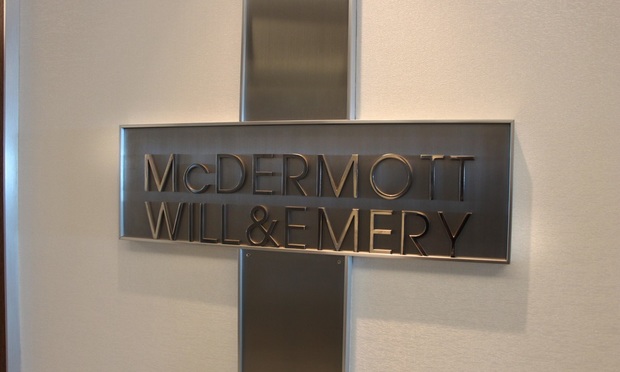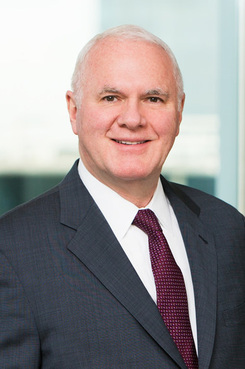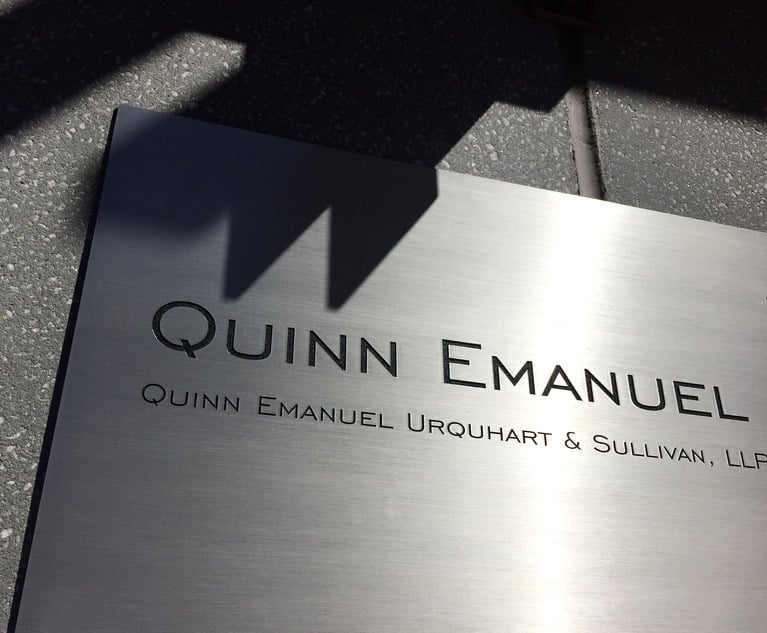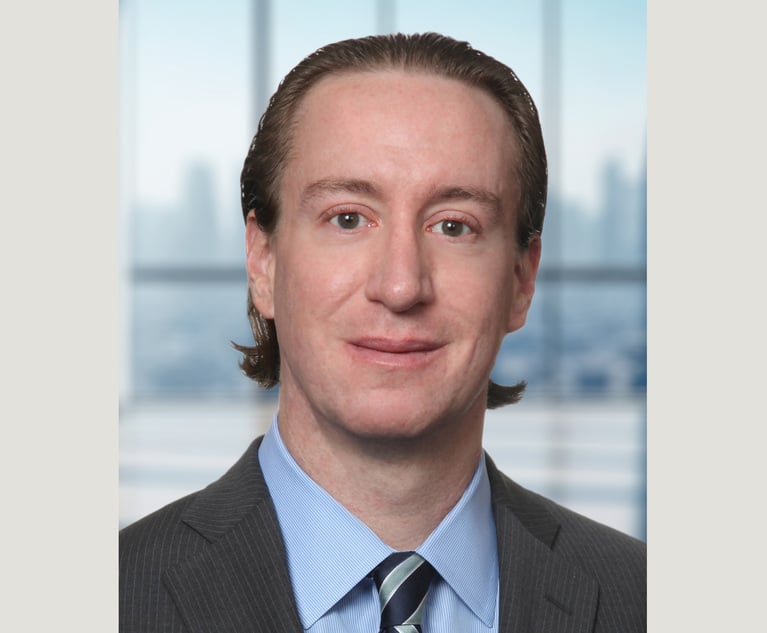ESOP's Fable—Or How An ERISA Star Came Home to McDermott
Big Law can feel like a small space. The niche employee stock ownership practice is a prime example.
October 22, 2018 at 06:00 AM
4 minute read

Theodore Becker happened upon his first case involving the then-nascent concept of employee stock ownership plans while he was working at his own law firm that until that time had mostly handled criminal defense work.
“A friend said, 'Do you know anything about ESOPs?'” Becker said. “I said, 'No.' He said, 'It doesn't matter. I don't know anything either.'”
The friend was Henry Seyfarth, the late founder of Seyfarth Shaw. It was the late 1980s, and ESOPs had been created just a few years earlier as part of the 1984 Tax Reform Act. ESOPs, which allow companies to spread ownership among their employees, are now part of the broader Employee Retirement Income Security Act (ERISA) practices at many large firms.
Becker has spent the intervening years becoming one of the country's foremost practitioners in the niche ESOP space. On Monday, McDermott Will & Emery is set to announce that it has hired the Chicago-based Becker, who most recently served as chair of the national employee benefits and ERISA litigation team at Drinker Biddle & Reath, which he joined in 2013 from Morgan, Lewis & Bockius. McDermott is also hiring Drinker Biddle counsel Richard Pearl, who previously worked at Morgan Lewis before joining his now former firm in 2016.
The growth of ESOPs has led Becker to a slew of Big Law firms. He first joined Jenkens & Gilchrist in 2000—only a few years after that now-defunct firm hired Paul Daugerdas, who is currently serving a 15-year prison sentence for his involvement in a tax shelter scam. At Jenkens & Gilchrist, Becker worked with Erin Turley, now a member of the managing committee at McDermott and who recruited Becker to the firm over a coffee on the sidelines of an ESOP conference in Washington, D.C.
McDermott's former ESOP chair, William Merten, was part of a group of employee benefits partners who left the firm last year to join Winston & Strawn.
When Jenkens & Gilchrist dissolved in 2007, Becker landed at Morgan Lewis, where he worked alongside David Ackerman—a man he referred to as “the dean of employee stock-ownership plans.” Ackerman died in 2016. The bulk of McDermott's ESOP team today was also once at Morgan Lewis, including partners Turley and Allison Wilkerson.
 Theodore Becker
Theodore Becker“I just concluded a case where Erin and I [defended] an ESOP transaction litigation against the Department of Labor together. We've always kept in touch and worked together,” Becker said. “So now, it's like a homecoming again.”
Becker's practice often involves defending ESOP transactions against challenges from the Labor Department or individuals involved in the deals who often argue about valuation. The Labor Department regulates ESOPs alongside the Internal Revenue Service.
Becker said he has come to believe that companies owned by their employees often perform better than other ownership structures. They are often more collegial, he said, and are more likely to weather financial storms without large layoffs.
“Most of the ESOP companies are great places to work—I frankly wish law firms could have ESOPs,” Becker joked. “I just think generally that when people have a stake in the company that they approach things differently. True law firm partnerships are a good example of that. McDermott is a good example of that, and it's one of the reasons I'm going there. You see a lot of cooperation.”
As for the original case that got Becker involved in ESOPs, it involved a former Chicago-based corporate raider, Clyde Engle, who had sued a regional bank's board of directors over its ESOP plan. Becker represented the board of directors and later an ESOP trustee in one of the first ESOP-based litigation cases. He said it's an example of how a career can take unexpected turns.
“Sometimes associates ask me, 'How do I plan my career path?'” Becker said. “And I say, 'There are some things you can plan and some you can't. And some things happen by serendipity.' And that's how I got into the ERISA and more particularly the ESOP practice.”
This content has been archived. It is available through our partners, LexisNexis® and Bloomberg Law.
To view this content, please continue to their sites.
Not a Lexis Subscriber?
Subscribe Now
Not a Bloomberg Law Subscriber?
Subscribe Now
NOT FOR REPRINT
© 2025 ALM Global, LLC, All Rights Reserved. Request academic re-use from www.copyright.com. All other uses, submit a request to [email protected]. For more information visit Asset & Logo Licensing.
You Might Like
View All
Saul Ewing Loses Two Partners to Fox Rothschild, Marking Four Fla. Partner Exits in Last 13 Months
3 minute read
Willkie Adds Five-Lawyer Team From Quinn Emanuel in Germany

Dentons Taps D.C. Capital Markets Attorney for New US Managing Partner

Exceptional Growth Becoming the Rule? Demand Drove Strong Year for Big Law
Trending Stories
- 1ACC CLO Survey Waves Warning Flags for Boards
- 2States Accuse Trump of Thwarting Court's Funding Restoration Order
- 3Microsoft Becomes Latest Tech Company to Face Claims of Stealing Marketing Commissions From Influencers
- 4Coral Gables Attorney Busted for Stalking Lawyer
- 5Trump's DOJ Delays Releasing Jan. 6 FBI Agents List Under Consent Order
Who Got The Work
J. Brugh Lower of Gibbons has entered an appearance for industrial equipment supplier Devco Corporation in a pending trademark infringement lawsuit. The suit, accusing the defendant of selling knock-off Graco products, was filed Dec. 18 in New Jersey District Court by Rivkin Radler on behalf of Graco Inc. and Graco Minnesota. The case, assigned to U.S. District Judge Zahid N. Quraishi, is 3:24-cv-11294, Graco Inc. et al v. Devco Corporation.
Who Got The Work
Rebecca Maller-Stein and Kent A. Yalowitz of Arnold & Porter Kaye Scholer have entered their appearances for Hanaco Venture Capital and its executives, Lior Prosor and David Frankel, in a pending securities lawsuit. The action, filed on Dec. 24 in New York Southern District Court by Zell, Aron & Co. on behalf of Goldeneye Advisors, accuses the defendants of negligently and fraudulently managing the plaintiff's $1 million investment. The case, assigned to U.S. District Judge Vernon S. Broderick, is 1:24-cv-09918, Goldeneye Advisors, LLC v. Hanaco Venture Capital, Ltd. et al.
Who Got The Work
Attorneys from A&O Shearman has stepped in as defense counsel for Toronto-Dominion Bank and other defendants in a pending securities class action. The suit, filed Dec. 11 in New York Southern District Court by Bleichmar Fonti & Auld, accuses the defendants of concealing the bank's 'pervasive' deficiencies in regards to its compliance with the Bank Secrecy Act and the quality of its anti-money laundering controls. The case, assigned to U.S. District Judge Arun Subramanian, is 1:24-cv-09445, Gonzalez v. The Toronto-Dominion Bank et al.
Who Got The Work
Crown Castle International, a Pennsylvania company providing shared communications infrastructure, has turned to Luke D. Wolf of Gordon Rees Scully Mansukhani to fend off a pending breach-of-contract lawsuit. The court action, filed Nov. 25 in Michigan Eastern District Court by Hooper Hathaway PC on behalf of The Town Residences LLC, accuses Crown Castle of failing to transfer approximately $30,000 in utility payments from T-Mobile in breach of a roof-top lease and assignment agreement. The case, assigned to U.S. District Judge Susan K. Declercq, is 2:24-cv-13131, The Town Residences LLC v. T-Mobile US, Inc. et al.
Who Got The Work
Wilfred P. Coronato and Daniel M. Schwartz of McCarter & English have stepped in as defense counsel to Electrolux Home Products Inc. in a pending product liability lawsuit. The court action, filed Nov. 26 in New York Eastern District Court by Poulos Lopiccolo PC and Nagel Rice LLP on behalf of David Stern, alleges that the defendant's refrigerators’ drawers and shelving repeatedly break and fall apart within months after purchase. The case, assigned to U.S. District Judge Joan M. Azrack, is 2:24-cv-08204, Stern v. Electrolux Home Products, Inc.
Featured Firms
Law Offices of Gary Martin Hays & Associates, P.C.
(470) 294-1674
Law Offices of Mark E. Salomone
(857) 444-6468
Smith & Hassler
(713) 739-1250










